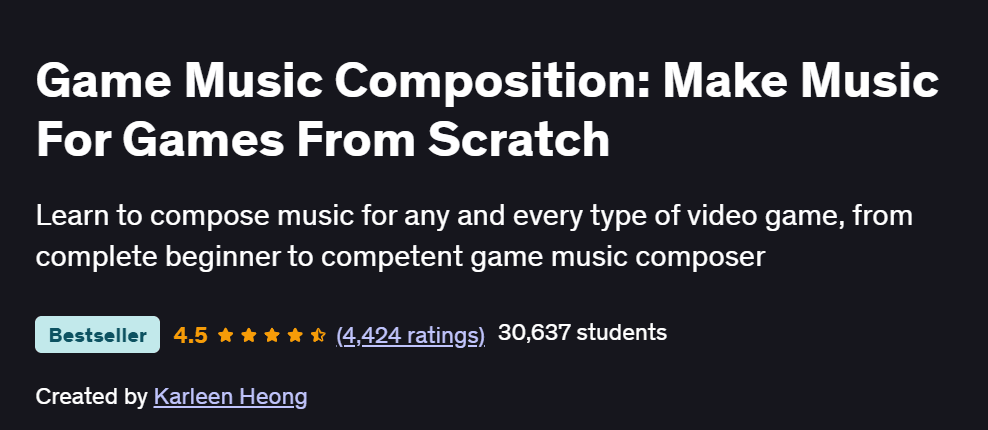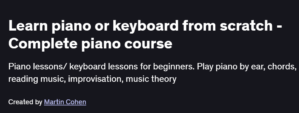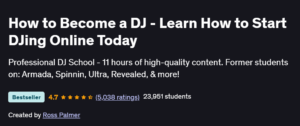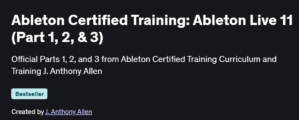What will you in Game Music Composition: Make Music For Games From Scratch Course
- Understand the principles of composing music specifically for games and interactive media
- Craft memorable themes, motifs, and adaptive music that respond to gameplay
- Use DAWs (e.g., Logic Pro, Cubase, FL Studio) and virtual instruments for orchestration
- Implement middleware workflows (FMOD, Wwise) to integrate your music into game engines
- Develop scoring techniques for different game genres: action, RPG, horror, and ambient
Program Overview
Introduction to Game Music
⏳ 30 minutes
Overview of game music history and its role in player experience
Key differences between linear and interactive music
DAW Setup & Virtual Instruments
⏳ 1 hour
Configuring your DAW for scoring: tempo maps, markers, and templates
Selecting and programming orchestral, electronic, and hybrid VIs
Motifs, Themes & Harmony
⏳ 1 hour
Crafting leitmotifs and developing thematic material
Advanced harmony and orchestration techniques for emotional impact
Adaptive & Interactive Scoring
⏳ 1 hour
Designing stems and layers for in-game variation
Triggering transitions, stingers, and dynamic crossfades
Middleware Integration (FMOD/Wwise)
⏳ 45 minutes
Importing audio assets and building event-driven music systems
Parameter-driven modulation and real-time sequencing
Genre-Specific Approaches
⏳ 1 hour
Action/adventure: driving rhythms and brass fanfares
RPG/ambient: evolving textures, pads, and leitmotif variations
Horror/suspense: atonal drones, tension-building techniques
Mixing & Mastering for Games
⏳ 45 minutes
Balancing stems, side-chaining with SFX, and ensuring clarity
Loudness standards, looping, and file delivery best practices
Portfolio Project & Next Steps
⏳ 30 minutes
Composing, integrating, and presenting a short interactive score
Building a demo reel and marketing yourself as a game composer
Get certificate
Job Outlook
- Game music composers are in demand across AAA studios, indie developers, and mobile game companies
- Roles include Composer, Sound Designer, Audio Implementer, and Technical Composer
- Freelance opportunities scoring indie titles, mods, and VR/AR projects
- Strong portfolio of adaptive music and middleware know-how enhances employability
Specification: Game Music Composition: Make Music For Games From Scratch
|
FAQs
- Basic DAW familiarity recommended but not mandatory.
- Introduces composition for interactive media and games.
- Covers orchestration and virtual instrument usage.
- Teaches adaptive music techniques responsive to gameplay.
- Suitable for beginners aiming to compose for games.
- Techniques for creating motifs and thematic material.
- Building stems and layers for dynamic adaptation.
- Implementing triggers, stingers, and crossfades.
- Applying adaptive scoring to various game genres.
- Ensures music responds fluidly to gameplay events.
- Guidance on FMOD and Wwise integration.
- Parameter-driven modulation and event sequencing.
- Importing and managing audio assets for real-time use.
- Connecting music triggers to gameplay events.
- Practical exercises to build interactive music systems.
- Action/adventure: driving rhythms and brass fanfares.
- RPG/ambient: evolving textures, pads, and leitmotif variations.
- Horror/suspense: tension-building techniques and atonal drones.
- Genre-focused exercises for composition practice.
- Builds versatility for professional game scoring.
- Prepares learners for composing, sound designing, and audio implementation roles.
- Portfolio project included to showcase skills.
- Builds industry-relevant experience for AAA or indie titles.
- Teaches professional mixing, mastering, and delivery standards.
- Certificate demonstrates completion and proficiency in game music composition.





